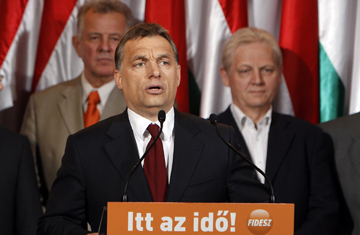
Hungarian opposition Fidesz party leader Viktor Orban delivers a victory speech in central Budapest, April 11, 2010.
In one of the first major votes in Europe since the economic crisis struck, conservative and extreme-right parties swept the first round of Hungary's parliamentary elections on Sunday, toppling the ruling Hungarian Socialist Party and demonstrating how angry people are in one of the worst-hit countries on the continent.
After two terms in power for the Socialists, known as MSzP, the center-right Fidesz party had long been favored to win this election. Fidesz, led by Viktor Orban, captured 52.8% of the vote, compared to just 19.3% for MSzP. But hardships fostered by the economic crisis upset the political status quo by giving sudden rise to the far-right Jobbik party, which won an unprecedented 16.7% of the vote to finish in a close third.
Fidesz might be the big winner — the party goes into the second round of the elections on April 25 within grasp of the two-thirds parliamentary majority required to make constitutional changes — but it is Jobbik's strong showing that has shocked many political analysts and ordinary Hungarians. The party, which espoused nationalist and anti-Roma rhetoric during the campaign, has proved it is now a force in Hungarian politics, though how it will factor into any future government remains unclear.
Many analysts see Jobbik's ascendancy as a sign of disenchantment among an electorate weary of politicians and battered by the financial crisis. Hungary has had a rough time lately: the economy contracted by 6.3% in 2009 and unemployment now tops 10%. Also last year, the previous Socialist Prime Minister, Ferenc Gyurcsany, resigned following years of controversy that began when he admitted that his party had lied about the state of the economy before 2006 elections. "[Jobbik] is a protest movement," says Laszlo Csaba, an economics professor at Budapest's Central European University. "And without strong ideological or organization glue, I think they'll have trouble staying together."
But if Jobbik's rise sprang from anger, it was directed almost exclusively at the incumbent Socialists, who have been in power since 2002 and proved unable to gain a consensus for economic reform. Indeed, Jobbik's gains among rural voters appear to have come at the expense of the MSzP, formerly the champion of the lower class. Many of the party's supporters have been attracted to its extremism. Jobbik's leader, Gabor Vona, is a founder of the Magyar Garda (Hungarian Guard) paramilitary group, whose anti-Roma rhetoric and adoption of nationalist symbols also used by World War II-era fascist groups have triggered alarm across Europe. The Hungarian Supreme Court banned the group last year, but while it was still active, many Jobbik politicians expressed sympathy for it.
With Fidesz's simple parliamentary majority assured even before the second round of voting, Orban will not have to form a coalition with Jobbik in order to rule — a prospect feared by many during the campaign. But Jobbik will undoubtedly still have influence in national affairs. "It is not clear what Orban will do to neutralize Jobbik," says Alex Kuli, an analyst for the Budapest-based consultancy Political Capital. "Will he cooperate with Jobbik and risk international criticism, or will he try to outdo them on some of their right-wing issues? He's going to have a tough time."
This is certainly true. Sunday's results were a vindication for Orban, who has waited in the wings of power since his last term as Prime Minister from 1998-2002. But he resumes office at perhaps the most difficult juncture in Hungary's post-communist years. As soon-to-be leader of a country with one of the weakest economies in the European Union, Orban will have no choice but to continue the unpopular austerity measures of the outgoing Socialists — policies that Fidesz had largely opposed while in opposition. "Orban is going to have to make some hard decisions," Kuli says. "And he won't have extra money to throw around" to satisfy voters. Some fear this will make voters even more disillusioned and fuel more support for Jobbik.
Csaba argues, however, that Orban is in a strong position to make unpopular choices and survive. "Fidesz has made a transformation over the past two or three years into a mainstream conservative party," he says. "They are all about fiscal discipline. I don't think they will make a U-turn from the reform policies of the current government. They made no populist promises during the campaign. These [promises] were made by Jobbik."
But whatever Fidesz's plans may be — the party was largely silent about its economic policies during the campaign — there is no doubt that Hungary is now gripped by a new sense of hope, a sentiment painfully absent from the political scene in recent years. "I really think this is a new beginning," says Monika Szente, a 37-year-old teacher living in Budapest. "I am very, very enthusiastic. Change won't happen overnight, but if anyone can solve the problems in this country, Fidesz can."
